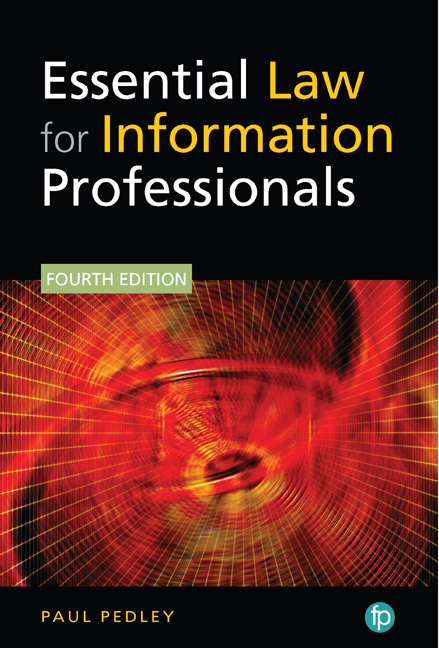Book contents
- Frontmatter
- Dedication
- Contents
- Disclaimer
- List of Figures and Tables
- Table of Statutes, Etc.
- Table of Cases
- Abbreviations
- Glossary of Terms
- Preface
- Chapter 1 General law and background
- Chapter 2 Library Law
- Chapter 3 Copyright
- Chapter 4 Legal Deposit
- Chapter 5 Breach of Confidence
- Chapter 6 Contracts and Licensing Agreements
- Chapter 7 Data Protection
- Chapter 8 Privacy
- Chapter 9 Freedom of Information
- Chapter 10 Human Rights
- Chapter 11 Re-use of Public Sector Information
- Chapter 12 Defamation
- Chapter 13 Professional Liability
- Chapter 14 Cybersecurity and Cybercrime
- Chapter 15 Disability Discrimination
- Chapter 16 Other Legal Issues Relevant to Librarians
- References
- Appendix 1 Brexit and the Orphan Works Exception
- Appendix 2 CILIP'S Ethical Framework
- Index
Chapter 6 - Contracts and Licensing Agreements
Published online by Cambridge University Press: 27 March 2020
- Frontmatter
- Dedication
- Contents
- Disclaimer
- List of Figures and Tables
- Table of Statutes, Etc.
- Table of Cases
- Abbreviations
- Glossary of Terms
- Preface
- Chapter 1 General law and background
- Chapter 2 Library Law
- Chapter 3 Copyright
- Chapter 4 Legal Deposit
- Chapter 5 Breach of Confidence
- Chapter 6 Contracts and Licensing Agreements
- Chapter 7 Data Protection
- Chapter 8 Privacy
- Chapter 9 Freedom of Information
- Chapter 10 Human Rights
- Chapter 11 Re-use of Public Sector Information
- Chapter 12 Defamation
- Chapter 13 Professional Liability
- Chapter 14 Cybersecurity and Cybercrime
- Chapter 15 Disability Discrimination
- Chapter 16 Other Legal Issues Relevant to Librarians
- References
- Appendix 1 Brexit and the Orphan Works Exception
- Appendix 2 CILIP'S Ethical Framework
- Index
Summary
General principles
Information professionals need to be able to negotiate licence agreements with information providers, because licences are the means by which access to digital information products is usually controlled. Information professionals are in the business of providing access to information. They also have an obligation to respect the moral and legal rights of the creators and distributors of intellectual property.
Some would argue that copyright exceptions and limitations have been rendered practically meaningless in the digital arena. How, for example, are the limitations and exceptions to be applied in the digital environment in view of the widespread deployment of technological protection measures?
The exceptions available under the CDPA are extremely limited in scope. To get around these limitations, information professionals are increasingly turning to licences as the means of providing access to works. Licences are binding on both parties. They are governed by the law of contract and enable information professionals to reach agreement with rights holders to permit their users to have access to electronic information services, such as online databases, ejournals, or websites, in ways that meet their users’ needs.
It is important to point out that a licence does not confer ownership rights. It merely specifies the conditions upon which databases and other copyright works can be used and exploited and by whom. There needs to be a mindshift from ownership to leasing. Licensees are merely provided with access to content for a limited period of time. Typically, the licences that information professionals negotiate are non-exclusive, granting the same rights to many different users.
Where there is a contract, a licence or a set of terms and conditions in place this will normally override copyright law. There isn't a clause in the CDPA 1988 (as amended) which comprehensively protects all of the copyright exceptions and which applies in all circumstances. There are instead a number of instances where specific exceptions are accompanied by wording along the lines of:
To the extent that a term of a contract purports to prevent or restrict the making of a copy which, by virtue of this paragraph, would not infringe any right conferred by this Chapter, that term is unenforceable.
- Type
- Chapter
- Information
- Essential Law for Information Professionals , pp. 115 - 130Publisher: FacetPrint publication year: 2019
- 1
- Cited by



